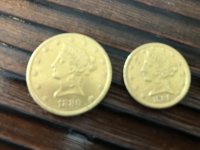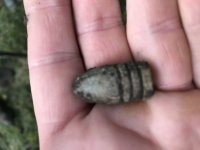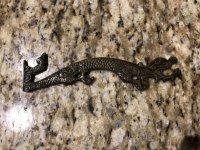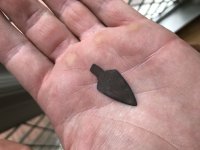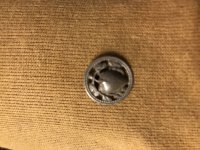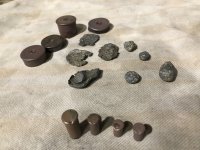bonedoctor
Jr. Member
- Aug 25, 2019
- 65
- 298
- Primary Interest:
- All Treasure Hunting
Hello! Im new here. Im also an amateur. Ive lived on a historical property for about 13 years. I bought a detector a few years ago but never got into using it until recently. I met someone who was really into it and told them about my place. They are very trustworthy and I decided to let them come hunt my place with me. Thought it would be a good experience.
Here is the background. My house sits in the oxbow of a well known creek. The house dates to 1936 and was built buy a fairly famous figure. a few decades later, a senator lived here. Their dad actually was a nominated presidential candidate in the 30s. There are many cool things related to this, but earlier history is more fascinating to me.
The first white man in my area is considered to be the father of our city. He had a trading post on our property, which was several miles outside of the city. It was on the creek, on my property. This would have been 1862. In 1870, there were about 50 people in the city. His post was only here a few years and it was mainly indian trading. It was removed around 1880. I need to find the exact date. There is a newspaper article about it.
When my house was built about 70 years later, it was placed in the center of the oxbow, and each end of the oxbow was cut off in the 40s. During this, I was told bodies were dug up in the process. Not much info on this.
We started to metal detect a few weeks ago. One of the first areas we hit gave us a copper arrowhead and a dime dating 1860! That was very exciting! Since then, we have mainly found a bunch of civil war ammo and some civil was era boot tips. We have found 5 rings in very random places.
A few days ago, I randomly decided to hit an area between my house and the old oxbow. I was shocked! We located an 1882 $5 gold piece! It was right at the top of the "bank" of the oxbow. Maybe 2' from its downward slope. We looked some more and found an 1880 $10 gold piece 15' away, and down the bank to the oxbow! The one on top of the bank was 6" deep, and the other down the bank was 2" deep.
Im not sure what to make of this. These coins were after the post, but before my house. Also, who would have had this gold on them, just walking through a creek area? This general area has also brought up a few things, such as some victorian era buttons and a cameo ring. We also dug up a confederate civil war bullet.
What are your suspicions? Do you think it was a fluke and someone dropped some coins? Do you think there is a cache?
Furthermore, what path does a gold coin take? Does it move up or down with time? In other words, at 2" and 6" depth, am I likely to find something much deeper? There is a 1940s wire fence in the area, and its a good 1' deep. So, I just dont know how extreme to go. After about a foot, the area gets sandy. The oxbow hasnt flowed since the 40s, but water occasionally fills in when it rains heavily, then it sinks into the ground. It is extremely heavy with ivy ground cover, and in the trees.
I have an excavator at my house today. Any opinions from the experience would be great!!
I should also mention, this area had figures like Jesse James, and many other famous outlaws. Also, the Chisholm trail goes through our city, and a branch of the trail goes through a portion of my property. Maybe 500' from the gold find.
Here is the background. My house sits in the oxbow of a well known creek. The house dates to 1936 and was built buy a fairly famous figure. a few decades later, a senator lived here. Their dad actually was a nominated presidential candidate in the 30s. There are many cool things related to this, but earlier history is more fascinating to me.
The first white man in my area is considered to be the father of our city. He had a trading post on our property, which was several miles outside of the city. It was on the creek, on my property. This would have been 1862. In 1870, there were about 50 people in the city. His post was only here a few years and it was mainly indian trading. It was removed around 1880. I need to find the exact date. There is a newspaper article about it.
When my house was built about 70 years later, it was placed in the center of the oxbow, and each end of the oxbow was cut off in the 40s. During this, I was told bodies were dug up in the process. Not much info on this.
We started to metal detect a few weeks ago. One of the first areas we hit gave us a copper arrowhead and a dime dating 1860! That was very exciting! Since then, we have mainly found a bunch of civil war ammo and some civil was era boot tips. We have found 5 rings in very random places.
A few days ago, I randomly decided to hit an area between my house and the old oxbow. I was shocked! We located an 1882 $5 gold piece! It was right at the top of the "bank" of the oxbow. Maybe 2' from its downward slope. We looked some more and found an 1880 $10 gold piece 15' away, and down the bank to the oxbow! The one on top of the bank was 6" deep, and the other down the bank was 2" deep.
Im not sure what to make of this. These coins were after the post, but before my house. Also, who would have had this gold on them, just walking through a creek area? This general area has also brought up a few things, such as some victorian era buttons and a cameo ring. We also dug up a confederate civil war bullet.
What are your suspicions? Do you think it was a fluke and someone dropped some coins? Do you think there is a cache?
Furthermore, what path does a gold coin take? Does it move up or down with time? In other words, at 2" and 6" depth, am I likely to find something much deeper? There is a 1940s wire fence in the area, and its a good 1' deep. So, I just dont know how extreme to go. After about a foot, the area gets sandy. The oxbow hasnt flowed since the 40s, but water occasionally fills in when it rains heavily, then it sinks into the ground. It is extremely heavy with ivy ground cover, and in the trees.
I have an excavator at my house today. Any opinions from the experience would be great!!
I should also mention, this area had figures like Jesse James, and many other famous outlaws. Also, the Chisholm trail goes through our city, and a branch of the trail goes through a portion of my property. Maybe 500' from the gold find.
Amazon Forum Fav 👍
Last edited:
Upvote
0


 You are in metal detecting paradise. Not to mention the other possibilties. Arrowheads and what not.
You are in metal detecting paradise. Not to mention the other possibilties. Arrowheads and what not.



